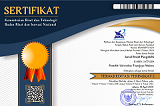Supporting the Influence of Psychological Capital and Transformational Leadership on Organizational Citizenship Behavior
Abstract
This action research aims to find out whether psychological capital and transformational leadership affect organizational citizenship behavior through work engagement with employees of a pharmaceutical packaging-based company in Bekasi. The data collection method in this study used survey methods and distributed questionnaires, respondents were selected by purposive sampling method. the criteria were permanent employees who worked in the same company based on the packaging of medicines located in Bekasi and have worked for at least the last 1 year. The number of samples used was 218 people. The analytical method used is the analysis structural equation model (SEM). The findings from this study were psychological capital, transformational leadership's positive and significant effect on work engagement, and work engagement's positive and considerable influence on organizational citizenship behavior. But psychological capital and transformational leadership does not affect organizational citizenship behavior. Besides that, psychological capital and transformational leadership have positive and significant effects on organizational citizenship behavior through work engagement. In addition, the results found that work engagement can mediate the influence between psychological capital and transformational leadership on organizational citizenship behavior.
Keywords
Full Text:
PDFReferences
Alfes, K., Shantz, A. D., Truss, C., & Soane, E. C. (2013). The link between perceived human resource management practices, engagement and employee behaviour: a moderated mediation model. The International Journal of Human Resource Management, 24(2), 330–351.
Bakker, A. B., & Albrecht, S. (2018). Work engagement: current trends. Career Development International.
Budi, F. S., & Purwandari, D. A. (2022). The Influence of Transformational leadership, Psycological Well-Being on Employees’ Performance with Organizational Citizen Behavior as Moderation. Budapest International Research and Critics Institute-Journal (BIRCI-Journal), 5(3), 21825–21838.
Caniëls, M. C. J., Semeijn, J. H., & Renders, I. H. M. (2018). Mind the mindset! The interaction of proactive personality, transformational leadership and growth mindset for engagement at work. Career Development International.
Cesar, M., Rizkillah, A., & Nurmayanti, S. (2022). The Influence of Psychological capital, Organizational Commitment & Transformational leadership on Organizational citizenship behavior: The Role of Moderation of Emotional Intellige. International Journal of Multicultural and Multireligious Understanding, 2015, 452–468.
Costantini, A., De Paola, F., Ceschi, A., Sartori, R., Meneghini, A. M., & Di Fabio, A. (2017). Work engagement and psychological capital in the Italian public administration: A new resource-based intervention programme. SA Journal of Industrial Psychology, 43(1), 1–11.
Crook, T. R., Ketchen Jr, D. J., Combs, J. G., & Todd, S. Y. (2008). Strategic resources and performance: a meta‐analysis. Strategic Management Journal, 29(11), 1141–1154.
Dewi, N. N., & Wibowo, R. (2020). The Effect of Leadership Style, Organizational Culture and Motivation on Employee Performance. Management Science Letters, 10(9), 2037–2044. https://doi.org/10.5267/j.msl.2020.2.008
Giancaspro, M. L., Callea, A., & Manuti, A. (2022). “I Like It like That”: A Study on the Relationship between Psychological capital, Work engagement and Extra-Role Behavior. Sustainability, 14(4), 2022.
Grover, S. L., Teo, S. T. T., Pick, D., Roche, M., & Newton, C. J. (2018). Psychological capital as a personal resource in the JD-R model. Personnel Review, 47(4), 968–984. https://doi.org/10.1108/PR-08-2016-0213
Guay, R. P., & Choi, D. (2015). To whom does transformational leadership matter more? An examination of neurotic and introverted followers and their organizational citizenship behavior. The Leadership Quarterly, 26(5), 851–862.
Gupta, M., Shaheen, M., & Reddy, P. K. (2017). Impact of psychological capital on organizational citizenship behavior: Mediation by work engagement. Journal of Management Development, 36(7), 973–983. https://doi.org/10.1108/JMD-06-2016-0084
Hadinata, L. J. F., & Surati, L. S. (2019). Pengaruh Gaya Kepemimpinan Transformasional dan Iklim Organisasi Terhadap Employee Engagement Serta Dampaknya Terhadap Organizational citizenship behavior. Jurnal Magister Manajemen Unram, 8(4).
Hair, J. F., Wolfinbarger, M., Ortinau, D. J., & Bush, R. P. (2019). Essentials of Marketing Research. Mc Graw Hill.
Hansen, J. A., & Pihl-Thingvad, S. (2019). Managing employee innovative behaviour through transformational and transactional leadership styles. Public Management Review, 21(6), 918–944.
Izzatuddin, S., & Kusumastuti, R. (2021). Relationship Between Employee Engagement and Innovative Behavior: Empirical Study of PT Bank BRI Syariah Tbk in DKI Jakarta, West Java, and Banten. Jurnal Administrasi Bisnis, 10(2), 87–98.
Jin, M., Zhang, Y., Wang, F., Huang, J., Feng, F., Gong, S., Wang, F., Zeng, L., Yuan, Z., & Wang, J. (2022). A cross sectional study of the impact of psychological capital on organisational citizenship behaviour among nurses: Mediating effect of work engagement. Journal of Nursing Management, 30(5), 1263–1272.
Katou, A. A., Koupkas, M., & Triantafillidou, E. (2022). Job demands-resources model, transformational leadership and organizational performance: a multilevel study. International Journal of Productivity and Performance Management, 71(7), 2704–2722.
Khalili, A. (2017). Transformational leadership and organizational citizenship behavior: The moderating role of emotional intelligence. Leadership & Organization Development Journal, 38(7), 1004–1015.
Martha Sari Ayu, Bambang Niko Pasla, Fathiyah, F., Lailatul Isnaini, & Novita Erlinda. (2022). Transformational Style of Leadership and Psychological capital: The Mediating Role of Work engagement. Jurnal Prajaiswara, 3(2), 147–155. https://doi.org/10.55351/prajaiswara.v3i2.47
Ngwenya, B., & Pelser, T. (2020). Impact of psychological capital on employee engagement, job satisfaction and employee performance in the manufacturing sector in Zimbabwe. SA Journal of Industrial Psychology, 46(1), 1–12.
Nielsen, K., Nielsen, M. B., Ogbonnaya, C., Känsälä, M., Saari, E., & Isaksson, K. (2017). Workplace resources to improve both employee well-being and performance: A systematic review and meta-analysis. In Work and Stress (Vol. 31, Issue 2, pp. 101–120). Routledge. https://doi.org/10.1080/02678373.2017.1304463
Nohe, C., & Hertel, G. (2017). Transformational leadership and organizational citizenship behavior: A meta-analytic test of underlying mechanisms. Frontiers in Psychology, 8, 1364.
Pillai, R. (2013). Transformational leadership for crisis management. In Handbook of research on crisis leadership in organizations (pp. 47–66). Edward Elgar Publishing.
Qalati, S. A., Zafar, Z., Fan, M., Sánchez Limón, M. L., & Khaskheli, M. B. (2022). Employee performance under transformational leadership and organizational citizenship behavior: A mediated model. Heliyon,
Schwarz, G. (2017). Transformational leadership and job performance: The role of organizational identification. In The Palgrave Handbook of Leadership in Transforming Asia (pp. 519–539). Palgrave Macmillan. https://doi.org/10.1057/978-1-137-57940-9_28
Seitz, S. R., & Owens, B. P. (2021). Transformable? A multi-dimensional exploration of transformational leadership and follower implicit person theories. European Journal of Work and Organizational Psychology, 30(1), 95–109. https://doi.org/10.1080/13594 32X.2020.1830761
Song, G. R., & Kim, K. S. (2020). More Similar, Better Belonging: Effect of Organizational citizenship behavior Profile Similarity on Ostracism. Journal of Applied Behavioral Science. https://doi.org/10.1177/0021886320977322
Sridadi, A. R., Eliyana, A., Gunawan, D. R., Kurniawan, M. D., Emur, A. P., & Yazid, Z. (2022). The mediating role of work engagement: A survey data on organizational citizenship behavior. Data in Brief, 42, 108243.
Sugiyono. (2013). Metode Penelitian Kuantitatif, Kualitatif dan R&D. Alfabeta.
Tawil, M. R., Mattalatta, M., Baharuddin, B., & Umar, A. (2023). The Role of Work engagement in Mediating Perceived Organizational Support and Organizational Commitment Relationship to Organizational citizenship behavior. International Journal of Social Service
Toth, I., Heinänen, S., & Kianto, A. (2022). Disentangling the elements of Psychological capital as drivers for work, organization and social engagement in knowledge-intensive work. Personnel Review. https://doi.org/10.1108/PR-01-2021-0031
Zeng, L., Feng, F., Jin, M., Xie, W., Li, X., Li, L., Peng, Y., & Wang, J. (2023). Psychological capital and organizational citizenship behavior among nurses during the COVID-19 epidemic: mediation of organizational commitment. BMC Nursing, 22(1). https://doi.org/10.1186/s12912-023-01332-7
Zia, M. Q., Naveed, M., Bashir, M. A., & Iqbal, A. (2021). The influence of servant leadership on employees’ outcomes via job embeddedness in hospitality industry. Journal of Hospitality and Tourism Insights, April. https://doi.org/10.1108/JHTI-01-2021-0003
DOI: https://doi.org/10.21107/pangabdhi.v9i2.22844
Refbacks
- There are currently no refbacks.
Copyright (c) 2023 Herman Oddyansyah Felani, Sukmo Hadi Nugroho

This work is licensed under a Creative Commons Attribution-ShareAlike 4.0 International License.
Jurnal Ilmiah Pangabdhi by Universitas Trunojoyo Madura is licensed under a Creative Commons Attribution-ShareAlike 4.0 International License.













